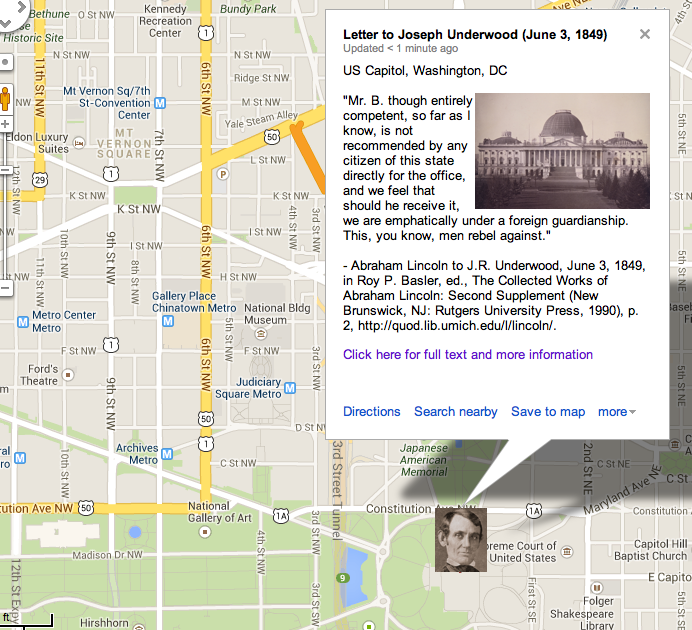Ranking
#136 on the list of 150 Most Teachable Lincoln Documents
Annotated Transcript
On This Date
Custom Map
How Historians Interpret
“In his view Butterfield belong to the ‘old fossil’ wing of the party, content to live on occasional federal appointments without ever building a strong state organization. Lincoln saw the land commissioner’s appointment as a means of building a viable Whig party in Illinois, which had never won in a presidential election or in a gubernatorial race. Properly used, that office could supplement the active local organizations that Lincoln had encouraged and the convention system that he had helped to establish.”
–David Herbert Donald, Lincoln (New York: Simon & Schuster, 1995), 140.
“He was defeated in his first campaign for the legislature – defeated in his first attempt as a candidate for Congress. Four times he was defeated as a candidate for Presidential Elector, because the Whigs of Illinois were yet in a hopeless minority. He was defeated in his application to be appointed Commissioner of the General Land Office. It was painful for Lincoln to reflect on these setbacks, for he was ‘keenly sensitive to his failures,’ and the mere mention of them made him ‘miserable,’ according to Herndon. ‘With me, the race of ambition has been a failure – a flat failure,’ he lamented in his mid-forties.”
–Michael Burlingame, Abraham Lincoln: A Life (2 volumes, originally published by Johns Hopkins University Press, 2008) Unedited Manuscript by Chapter, Lincoln Studies Center, Volume 1, Chapter 9 (PDF), 1037.
“One wonders why Lincoln ran for the office given the byzantine events that surrounded it. His candidacy jeopardized his friendship with Edwards, possibly Baker, and required him to secure recommendations in a short three weeks. Adding to his problems, Ewing probably removed Lincoln’s best letters of recommendation from his file. In a series of recently discovered letters, Lincoln questioned Ewing about the absence of endorsements from Indiana Whigs Richard Thompson and Elisha Embree known to have been placed on file. It was evident from the exchange that Ewing could not adequately explain their disappearance… The evidence strongly indicates that Whig politics and not Lincoln’s ambition was the significant factor in this controversy. Lincoln had more to lose than he had to gain personally from the battle over the appointment. From the standpoint of the Illinois Whig party, however, there was much to be gained. Lincoln was a proponent of an efficient party organization and was willing to implement reforms towards this end.”
–Thomas F. Schwartz, “’An Egregious Political Blunder’ Justin Butterfield, Lincoln, and Illinois Whiggery,” Journal of the Abraham Lincoln Association 8, no. 1 (1986): 9-19.
NOTE TO READERS
This page is under construction and will be developed further by students in the new “Understanding Lincoln” online course sponsored by the House Divided Project at Dickinson College and the Gilder Lehrman Institute of American History. To find out more about the course and to see some of our videotaped class sessions, including virtual field trips to Ford’s Theatre and Gettysburg, please visit our Livestream page at http://new.livestream.com/gilderlehrman/lincoln

